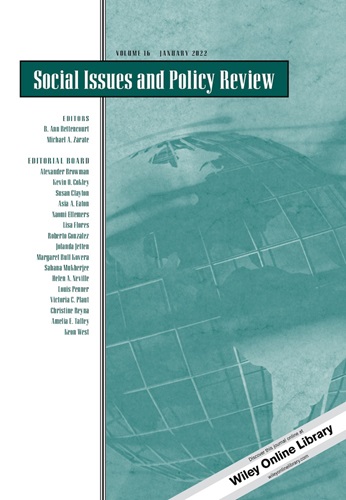Do Social Network Sites Enhance or Undermine Subjective Well‐Being? A Critical Review
IF 5.6
1区 心理学
Q1 PSYCHOLOGY, SOCIAL
引用次数: 609
Abstract
Social network sites are ubiquitous and now constitute a common tool people use to interact with one another in daily life. Here we review the consequences of interacting with social network sites for subjective well-being—that is, how people feel moment-to-moment and how satisfied they are with their lives. We begin by clarifying the constructs that we focus on in this review: social network sites and subjective well-being. Next, we review the literature that explains how these constructs are related. This research reveals: (a) negative relationships between passively using social network sites and subjective well-being, and (b) positive relationships between actively using social network sites and subjective well-being, with the former relationship being more robust than the latter. Specifically, passively using social network sites provokes social comparisons and envy, which have negative downstream consequences for subjective well-being. In contrast, when active usage of social network sites predicts subjective well-being, it seems to do so by creating social capital and stimulating feelings of social connectedness. We conclude by discussing the policy implications of this work.社交网站是增强还是破坏主观幸福感?批评性评论
社交网站无处不在,现在已经成为人们日常生活中相互交流的常用工具。在这里,我们回顾了与社交网站互动对主观幸福感的影响——也就是说,人们时时刻刻的感受以及他们对生活的满意程度。我们首先澄清我们在这篇综述中关注的结构:社交网站和主观幸福感。接下来,我们回顾了解释这些构念如何相关的文献。研究发现:(a)被动使用社交网站与主观幸福感呈负相关关系,(b)主动使用社交网站与主观幸福感呈正相关关系,且前者的关系强于后者。具体而言,被动使用社交网站会引发社会比较和嫉妒,这对主观幸福感有负面的下游影响。相反,当积极使用社交网站预测主观幸福感时,它似乎是通过创造社会资本和刺激社会联系感来实现的。最后,我们讨论了这项工作的政策含义。
本文章由计算机程序翻译,如有差异,请以英文原文为准。
求助全文
约1分钟内获得全文
求助全文
来源期刊

Social Issues and Policy Review
Multiple-
CiteScore
22.20
自引率
1.10%
发文量
9
期刊介绍:
The mission of Social Issues and Policy Review (SIPR) is to provide state of the art and timely theoretical and empirical reviews of topics and programs of research that are directly relevant to understanding and addressing social issues and public policy.Papers will be accessible and relevant to a broad audience and will normally be based on a program of research. Works in SIPR will represent perspectives directly relevant to the psychological study of social issues and public policy. Contributions are expected to be review papers that present a strong scholarly foundation and consider how research and theory can inform social issues and policy or articulate the implication of social issues and public policy for theory and research.
 求助内容:
求助内容: 应助结果提醒方式:
应助结果提醒方式:


